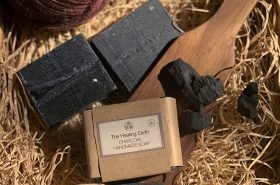Soap – like materials have been in use since 2800 BC in ancient Babylon.
Ancient Egyptians combined animal and vegetable oils with alkaline salts to create a soap-like substance. Finer soaps were later produced in Europe from the 16th century, using vegetable oils (such as olive oil) as opposed to animal fats.
Soap bars for the skin are broadly divided into two categories depending upon the base fatty acid present in it:
Oil Based Soaps
Glycerine Based Soaps
OIL-BASED SOAPS –
Many natural soap bars contain vegetable Oil (olive, jojoba, almond etc.) as a base ingredient due to its deeply moisturising and nourishing properties. The soaps provide the skin all the benefits that the base oil provide. For e.g. Almond oil is rich in Vitamin A and Vitamin E. Any soap bar made from PURE ORGANIC UNADULTERATED almond oil will provide these vitamins to the skin along with cleaning and exfoliation(if it contains an exfoliating agent). Most of the commercially available soaps contain palm oils which do not benefit the skin apart from cleaning.
GLYCERINE BASED SOAPS –
Glycerin is a natural product of the soap making process. However, manufacturers remove the glycerin to create other products such as moisturising lotions. Glycerin soaps retain the natural glycerin and may also have pure glycerin added to them to increase the glycerin content. Glycerin soap is gentler on skin than most soaps, making it a good choice for people who have particularly dry or sensitive skin.



